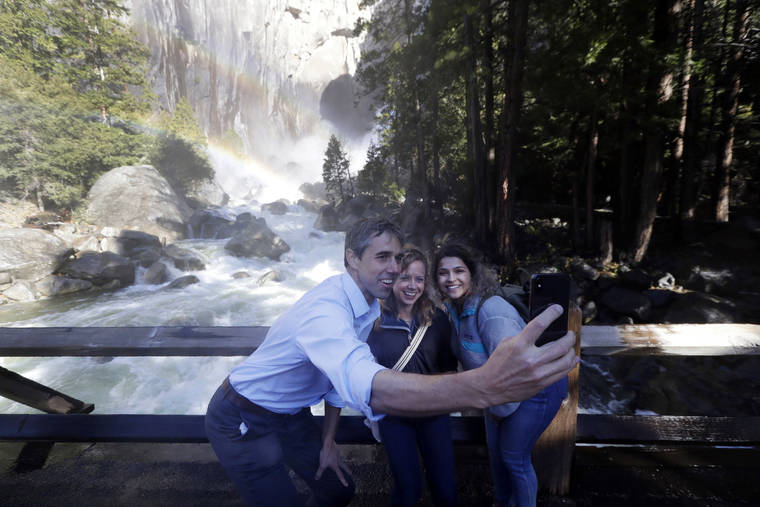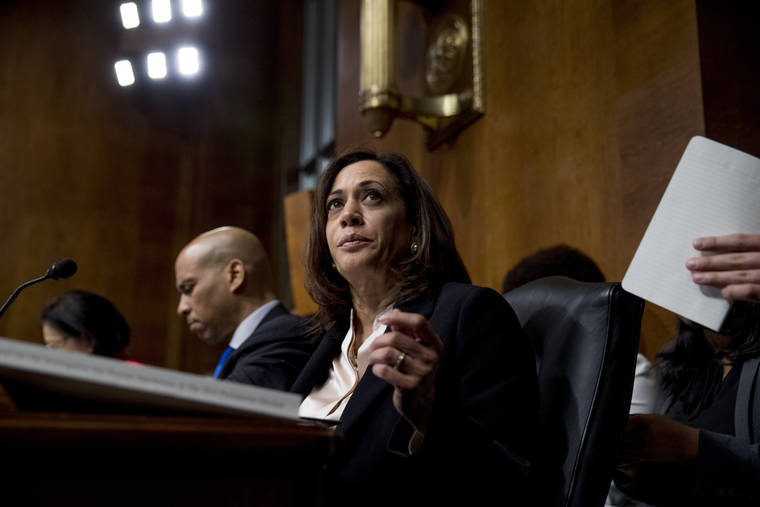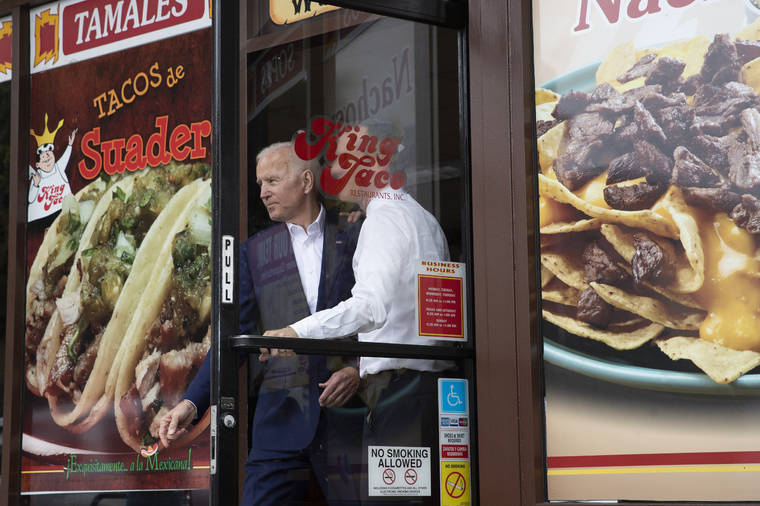BEVERLY HILLS, Calif. — The Democrats who want to be president are swarming California, competing for campaign cash and media attention while courting longtime allies of home-state Sen. Kamala Harris on their rival’s own turf.
Former Vice President Joe Biden swooped in to Los Angeles on Wednesday to raise money and snack on tacos with Mayor Eric Garcetti, who has yet to offer an endorsement despite backing Harris in the past. Biden went to three events over two days, including one that netted $750,000 and was attended by Hollywood powerbrokers, as well as “Miracle on the Hudson” pilot Sully Sullenberger.
Pete Buttigieg met with labor activists and LGBT donors, and promised to “vigorously contest California.” The mayor of South Bend, Indiana, also attended at least six fundraisers in the Bay Area and Los Angeles, including one hosted by actress Gwyneth Paltrow.
“We are consolidating our position as one of the top candidates in the presidential race,” he told a sold-out crowd Thursday at a West Hollywood gay bar.
Others who have visited the state include Vermont Sen. Bernie Sanders, former Texas Rep. Beto O’Rourke, Washington Gov. Jay Inslee, Massachusetts Sen. Elizabeth Warren, New Jersey Sen. Cory Booker and Minnesota Sen. Amy Klobuchar.
California has long been treated as an ATM by national Democrats, who often dash in and out for lucrative fundraisers. But the state has drawn a more intense focus after the date of the 2020 primary was moved up from June to March, with Harris uniquely positioned to capitalize on her home-state popularity at a make-or-break stage in the race.
Her aides have said California is central to their strategy to win the nomination, and they have promoted endorsements from elected officials as Harris plowed her way through fundraisers.
But what once seemed to be a formidable wall of support appears to have softened.
“Nothing’s locked up for me,” Harris told CNN’s “State of the Union” in an interview that aired Sunday.
Harris has trailed others in recent state polls. Susie Tompkins Buell, a Harris backer who was one of Hillary Clinton’s biggest donors, has held fundraisers for Buttigieg. Democratic Gov. Gavin Newsom, a longtime Harris ally who endorsed her, traded praise back and forth this past week with Buttigieg, who said the two were trying to set up a meeting.
“I don’t think it’s a slam dunk for anybody,” said former Sen. Barbara Boxer. “It’s not like it’s a tiny state where everyone knows their senator. It’s very large state with a lot of different communities and so I think it’s wide open.”
Harris’ campaign aides say they never took her standing for granted. Still, they point to her three statewide victories — once as senator and twice as attorney general — as proof she can win in California. They say Harris has worked hard to line up endorsements from state lawmakers and members of the state’s congressional delegation, while outraising her presidential competitors in the state.
“California’s early primary status makes it a key battleground for winning the Democratic nomination, and we are working hard to keep, earn and grow support for Senator Harris,” spokesman Ian Sams said Friday in a text message.
With months to go until voting begins in March, the contours of the race are destined to shift.
Many candidates, particularly those who are little-known or have little money, will be at a steep disadvantage. California is not only the most populous, but also one of the most geographically diverse. That makes campaigning difficult — and unaffordable — particularly when it comes to running TV ads in some of the most expensive media markets in the country.
It remains to be seen who will undertake a serious campaign across the state and who will rely mainly on photo opportunities built around fundraising visits.
“The reality is it’s so hard to run for president (here) and raise money … and what I think you are going to see is this field shrinking from 20 down to five or six,” said Steve Westly, a major Silicon Valley donor raising money for Biden who also served a term as the state’s elected controller. “Kamala is popular in California, but I think Joe is going to do surprisingly well on a lot of other people’s turf.”
Whoever wins will likely face a muddled result. Though the state offers nearly 500 delegates, they are apportioned based on how candidates perform in each individual congressional district. That will allow even those who do not win to pad their margins.
“We’re not going to make anyone the nominee,” said Dan Schnur, a former Republican strategist who now teaches at the University of Southern California. “We’re not going to keep anyone from being the nominee, either.”
Veteran Democratic strategist Garry South said it was smart strategy for Harris’ advisers to try to create the impression that she had the state locked up.
“I would be saying the same damn thing,” he said.
But California voters have not historically favored state politicians who ran for the presidency. Former Gov. Jerry Brown and former Sen. Alan Cranston, both Democrats, and Republican Pete Wilson, a former senator and governor, performed poorly when they were White House hopefuls.
“Other than Ronald Reagan, they’ve all fared very badly. Californians just don’t fall in love with their politicians,” said South, who managed Gray Davis’ winning campaigns for governor in 1998 and 2002 before voters recalled the Democrat. “They elect them like they are hiring a gardener or a plumber: ‘Do the job, do it competently and stay out of my face.’”
———
Associated Press writer Kathleen Ronayne in Sacramento, California, contributed to this report.




